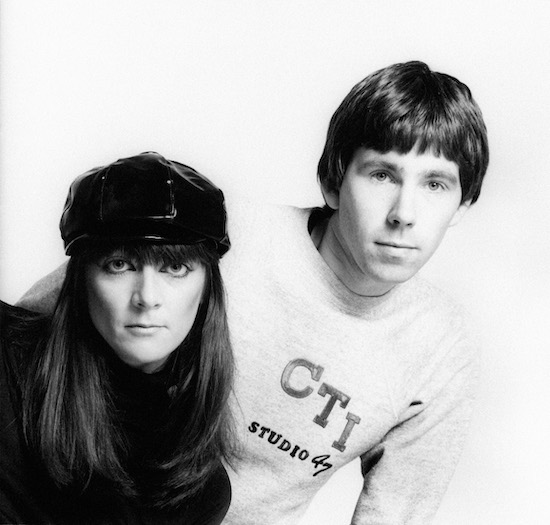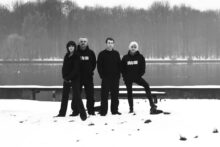Anyone familiar with Cosey Fanni Tutti’s acclaimed 2019 memoir Art Sex Music will know that alongside the abrasive turbulence of Throbbing Gristle’s first phase of musical and artistic activity, she was subjected to extreme abuse by her former partner, Genesis P*Orridge. The creative liberation that came after she and Chris Carter escaped that toxic situation and departed TG to go it alone in their new-found love affair is audible in the fizzing electro of their first releases together, Heartbeat, Trance and Songs Of Love & Lust, and especially their 1983 debut single ‘October Love Song’. For those who don’t know this rather sweet story, it bears repeating, as Cosey told it when I interviewed her some years ago. When testing the mics in their home studio, Chris asked her to say something, anything, to see how it sounded. “I had this vision of him sat in the other room with his headphones on, a really intimate situation where I could talk to him but I wasn’t in the same room as him,” Cosey told me, “So I told him how I felt about him, and that’s how ‘October Love Song’ was written, about how we got together: ‘do you remember how I took your hand on the stairs". It was like me whispering in his ear."
It strikes me that the intensity of this romanticism is part of the reason why for years Chris and Cosey were overlooked by some in favour of the other post-TG projects, Psychic TV and Coil. In them, P*Orridge and Peter Christopherson appealed to the element of the industrial fanbase that delighted in transgression, manipulation, and the exploration of the seamier meeting points of music, ritual, drugs and sex. There was perhaps a sneering, proto-edgelord disdain for Chris and Cosey’s decision to leave London and head up the A11 to rural Norfolk to create the C&C Music Factory in a disused school – for the narrow minded and performative transgressive, it must have appeared terribly conventional.
More fool them. For not only does nobody know what goes on behind brick walls, but the breadth and depth of Chris and Cosey’s output over the decades, currently subject to an extensive reissues campaign, is evidence of one of the most fruitful partnerships in the music that we cover here at tQ.
Chronologically, the reissue series of six albums begins with Elemental 7, released in 1984 as the soundtrack to an experimental film produced in collaboration with former COUM Transmissions member John Lacey, released on Cabaret Voltaire’s Doublevision imprint. The film, shot on VHS, is all hazy footage of woodland, a mister Evans in his greenhouse, the ruins of some grand edifice, flames, empty industrial buildings, the whole atmosphere one of an experimental take on classic BBC horror, or hauntology before the term was minted. The soundtrack fits, with muttering voices, doomily intoning bells, figures and faces appearing and disappearing and, in ‘Dancing Ghosts’, oddly cheerful blobs of ectoplasm having a knees-up at the start of a rave. It’s Chris and Cosey at their most ‘industrial’, if we’re being lazy, and might superficially be a sonic outlier from the rest of these reissues, yet it contains many of the elements that would form their distinctive sound through the next four decades – the nigh-on uncanniness of the depths of bass and feeling Carter conjures from his machines, Cosey’s distinctive cornet, guitar and use of voice.
Techno Primitiv, which came out a year later, adds to all that the duo’s ability to create minimal, electronic funk. Arguably the finest of their early 80s run of electro albums (1981’s Heartbeat, 1982’s Trance, 1984’s Songs Of Love & Lust were all reissued in 2010), it occupies a murky, sensual space, a threesome between exotica, goth and electronic pop. ‘Morning’, for instance, has whipcrack rhythms and repeated vocal incantations, a siren calling from the English mist; ‘Stolen Kisses’ is so effervescent you half feel they could have sold the song to Scott Aitken Waterman for a massive chart hit – I mean that in a good way.
As the decade went on, Chris & Cosey’s beats got tougher, the synths less glacial, the vocals more forthright. 1989’s Trust captures this new, more robust sound, especially on ‘Rise’, in which they bizarrely appear to have invented electroswing, albeit in a more militant form to the cursed genre to which posh kids drunkenly finger each other during gap yah surfing holidays in Cornwall. Most fascinating of all is the pumping ‘Watching You’, which is where I feel that the psychosexual aspect to Chris and Cosey’s music, always present, really starts to come to the fore. Sexual power dynamics are all across their work, their album and track titles, lyrics and artwork crackling with an erotic sensibility that is elusive and far from vanilla. These are songs where romantic love flirts with possession, teasing, even physical pain and extreme sensation. I’ve often felt watching the duo play live that there is a deep understanding between them that seems to carry with it all the decades of domestic and creative living, the intimacy over the washing up and between the sheets as well as in their home studio. Cosey’s mantra that "my life is my art, my art is my life" is surely all-embracing, after all. Perhaps the preference among many former TG fans for the supposedly more radical sounds of PTV and Coil has a whiff of misogyny to it, an assumption that Carter is there to ‘support’ Cosey, who sings nice songs (it’s an overlooked aspect to their music that her voice has a chalk-stream clarity that means you could easily imaging her as a 60s folk revival singer). Instead, live you witness that there is a constant eddy of energy between and through them that gives the music its extraordinary lift, this then is directed outwards to the audience with a different edge to the usual exchange in nightclub or gig as they offer up everything about their shared lives and creative practice, from the mucky to the mundane.
Cosey’s experiences working in pornography and as a stripper gave her a better grasp of gendered power dynamics than most. She most explicitly explored this on 1982 solo release Time To Tell, but it’s all over much of this intimately-created music. Trust is almost a prototype for its follow-up, 1991’s Pagan Tango. I’ve no idea if Chris and Cosey had a kitchen rave after half a pinger each, but opener ‘In Ecstacy’ and ‘Synthaesthesia’ have an early-night acid house warmth that evidences why the late great Andrew Weatherall was such a fan. From then on in, it gets saucy – ‘I Belong To Me’ (Cosey singing, not without menace, that “the man is mine”) leading into utter banger ‘Take Control’, where squelchy, leathery rhythms sit under a mantra, “I’m gaining power / I take control”, an intense reversal of the male gaze and domination. Similarly, ‘Feel To Me’ combines breathy vocals with a nerve-tingling synth line and rhythms that drop like hot wax, and ‘Sin’ is BDSM intonation “whipping, burning, rolling, turning, lashing, writhing, tasting, dying, dying on the bed of sin” that turns into a ruthless 4/4 pounding. It makes most other electronic body music of the era sound like the Belgian bloke off Eurotrash who liked to dress as a penguin wanking over a pack of kippers. Pagan Tango has it all – the tunes, the bangers, the desire, and ought to be seen as one of the toughest, yet most accessible, albums that emerged from the great post-TG explosion.
Two years later, Muzik Fantastique! hasn’t quite got the same oomph, though it starts off by taking things even further into the dancefloor, with the house-tinged ‘Fantastique’, the acid-squelched ‘Sound Of Sound’, wet funk in ‘Apocalypso’, before the more murky ‘Visions Love’ and the reflective, synth-washed delicacy of ‘Neverneverland’ and ‘Melancholia’.
Perhaps the most unexpected and hitherto even more overlooked record reissued as part of this series is 2007’s Feral Vapours Of The Silver Ether, released under the Carter Tutti moniker. It’s a quiet, reflective record, intimate yet spacious, much as I imagine its creation in their home studio under the vast, cloud-studded Fenland sky. Made up of vocal drones, strings, cornet and Cosey’s vocals, often half-sung, half-spoken, to the fore, it’s an ambient-adjacent album that ought to appeal to fans of Brian Eno’s On Land and Chris Carter’s beloved Enya alike. Given it originally came out during the final, fraught years of TG and a few years prior to the re-emergence of a refreshed and forward-looking period of activity that had as its zenith the wonderful Carter Tutti Void collaboration with Factory Floor’s Nik Colk Void, it is a record that feels both like a sanctuary of calm and a peaceful intake of breath before a new, more positive, storm.
Chris and Cosey’s consistent sonic palette across these releases meant that much of the music was ripe for retooling. Elements that perhaps sound of their time in terms of production were buffed up to date in the series of gigs and festival appearances under the Carter Tutti Plays Chris & Cosey moniker. Taking place alongside the Carter Tutti Void and X-TG Desertshore projects, these reinterpretations were warm, euphoric, psychedelic, joyous, intense, the manifestation of a romantic and creative partnership that, as it approaches its half-century, shows no sign of letting up or losing its fizz. Along with TG’s back catalogue and the early Chris and Cosey albums, these reissues are an essential documentation of one of music’s great love stories, intimacy distilled into sound.



